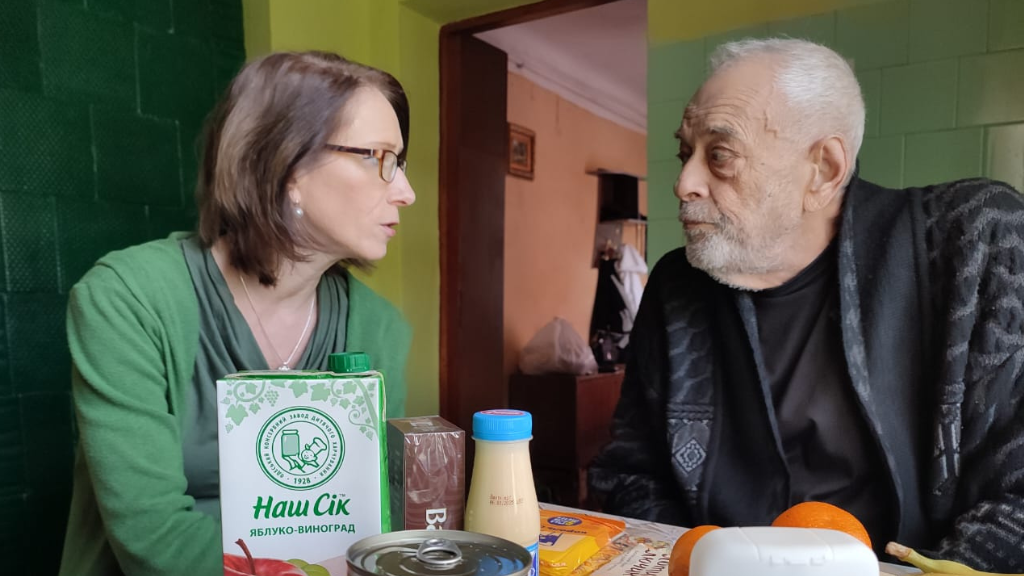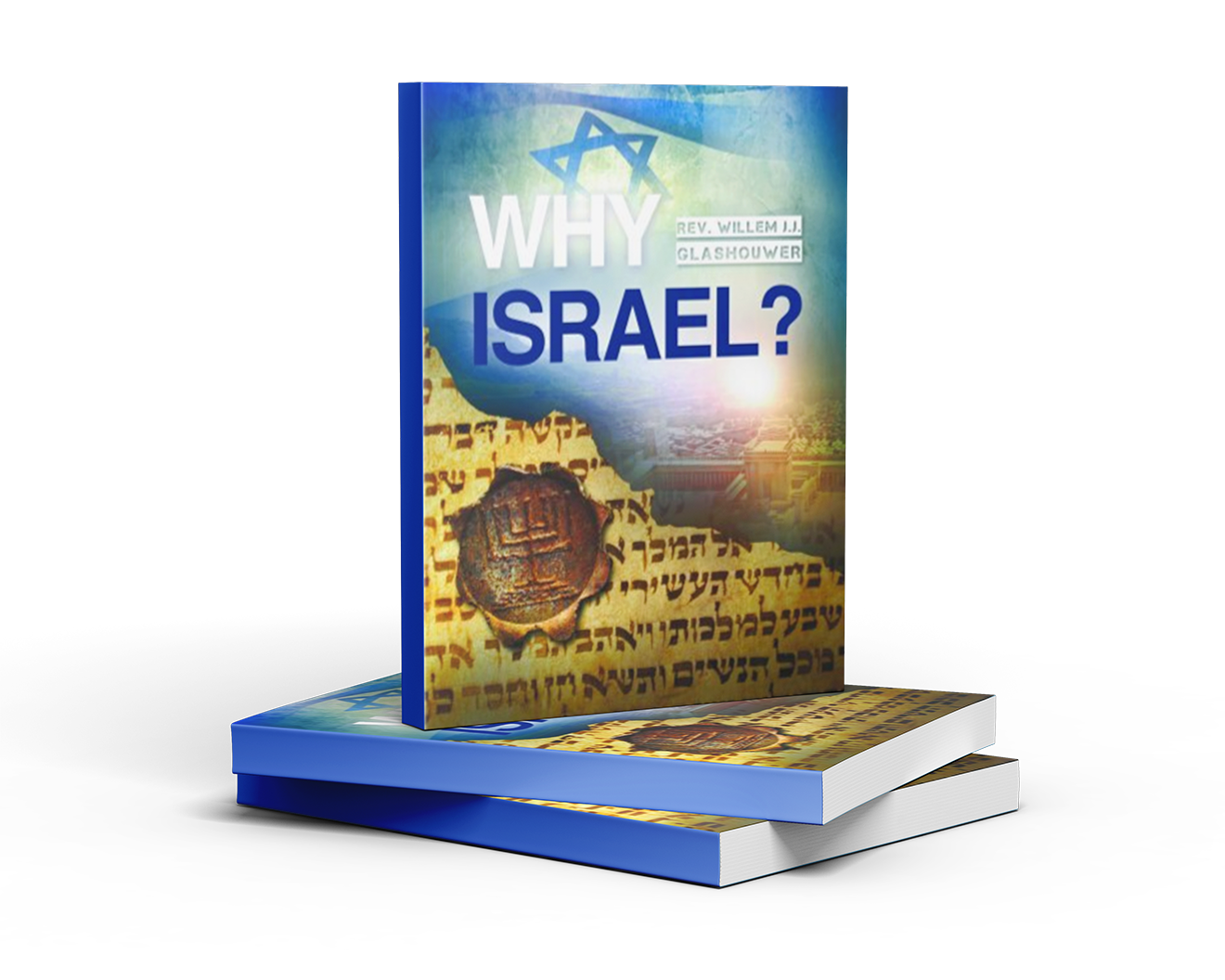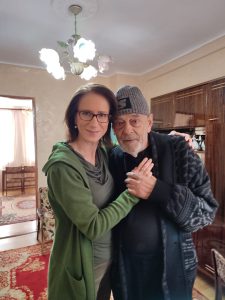Boris, the Sick Doctor
 Boris is grateful for everything we brought for him. | Photos: C4I Ukraine
Boris is grateful for everything we brought for him. | Photos: C4I Ukraine
As the war in Ukraine has well proceeded into its third year, our Christians for Israel (C4I) staff continues to visit Holocaust survivors and needy Jewish elderly.
In Chernivtsi, like in many Ukrainian Jewish communities, the first biographical information I receive about the survivors in our programme is not always the whole story. Over a period of time, we build a relationship of trust. Sometimes new, shocking fragments suddenly emerge that shed a completely different light on the person. The best thing is when God continues to write the biography.
Emma and her brother Boris have been in our programme for a while now. We were told right away that Emma had to speak for her brother as he suffers from schizophrenia and it would be unlikely for him to be able to answer questions. “Boris graduated from a medical institute and was assigned to the BAM (construction of the Baikal-Amur Main Line in Siberia) as a doctor. There he fell ill with schizophrenia and was given an invalid status.” So much for the official version in innocuous Soviet talk. The labels ‘invalid’ and ‘schizophrenic’ were quickly assigned in the Soviet Union. In other countries, therapy would have been the logical next step after the diagnosis. But in a state where you can ‘fall ill’ with schizophrenia during a construction project, obviously no one would think of therapy. I have learned to ask questions when hearing such descriptions.
‘There was a spark of understanding when we first met, and even now Boris doesn’t seem particularly schizophrenic.’
As we enter the small house in Synagogue Street, where Boris spent his childhood and lives to this day, we are led to a painting in the back room that shows him at the height of his short career—as a military doctor in uniform. There was a spark of understanding when we first met, and even now Boris doesn’t seem particularly schizophrenic. He is happy about every item that I pull out of our colorful shopping bag—the challah bread, the Napoleon cake, the sweetened condensed milk (always a hit), the can of beef, the shower gel. At the end, he gratefully kisses my hand.
“Only Mom and Grandma Survived”
“Did we show you the portrait of our mother?” asks Emma. “Her name was Riva. She was a beautiful woman. Here, look at the portrait. The Nazis deported her to the ghetto, together with Grandma. They survived three camps. Mom’s little brother had to knock out the gold teeth of the dead Jews, clean them properly and bring them to the guards. In the end they were in Bershad. Only mom and grandma survived.”

Boris with his sister Emma (left), C4I employee Anemone and the portraits of his mother and grandmother. Most of the family perished in the Holocaust.
After the war, Riva was swept along with the stream of survivors to the relatively unscathed town of Chernivtsi. Here she met Jafar Ali, who, as I learn in the current version of the story, was not a Crimean Tatar, but belonged to the temporarily Islamized Jewish ethnic group of the Karaim in Crimea. “His whole family was murdered during the war,” Emma tells me. “Dad and Mom met here in Chernivtsi. It was a great love. They were very poor, but they were together for 67 years.”
He wants to play something for us on the keyboard if we have that much time, says Boris. We have time, and Boris plays. The improvised chords help his soul breathe.
Siberian Trauma
“Boris is the youngest of us three siblings,” Emma tells me, taking me aside. “He was mom’s favorite child. He was a military doctor. They sent him to the Baikal-Amur Main Line in Siberia. The working conditions there were catastrophic—people were starving and freezing to death. And Boris was responsible for their health. One of the young soldiers entrusted to his care shot himself. Boris couldn’t cope with that. Our older brother had to bring him back. Since then he has had a handicapped status.

During his mandatory military service, Boris was assigned as a doctor to the large-scale Soviet Baikal-Amur Main Line project – with tragic consequences.
“His wife left him back then. He lived with Mom until she died. Mom asked me on her deathbed to take care of him—to make sure he was dressed properly and had something to eat. I don’t have much either, but I do what I can; I do it for her.”
I have a brief moment with Boris at the end. I tell him that he has a professional colleague in heaven… that the God of Israel is also a doctor—for His people… that He has promised to wipe away all the tears of His people and that He will also heal Boris’ broken heart.
‘The God of Israel is also a doctor—for His people…’
The way Boris hugs me goodbye, I know that he has understood me very well. And that the Lord, the consolation of Israel, has once again done something that no human being can do; something that I can only ask for, and for which I keep coming to Ukraine.
You can support first- or second-generation Holocaust survivors in Ukraine and Moldova through Christians for Israel. Our workers on the ground make sure that the help arrives and that the message of love is conveyed during personal visits.
Why Israel? by Rev. Willem Glashouwer
Order the book
